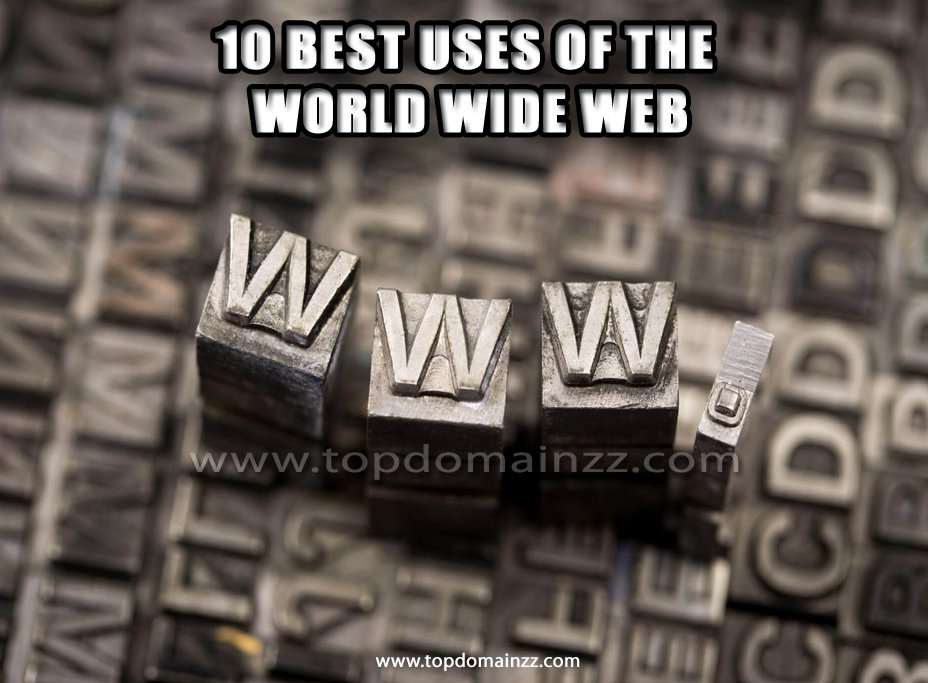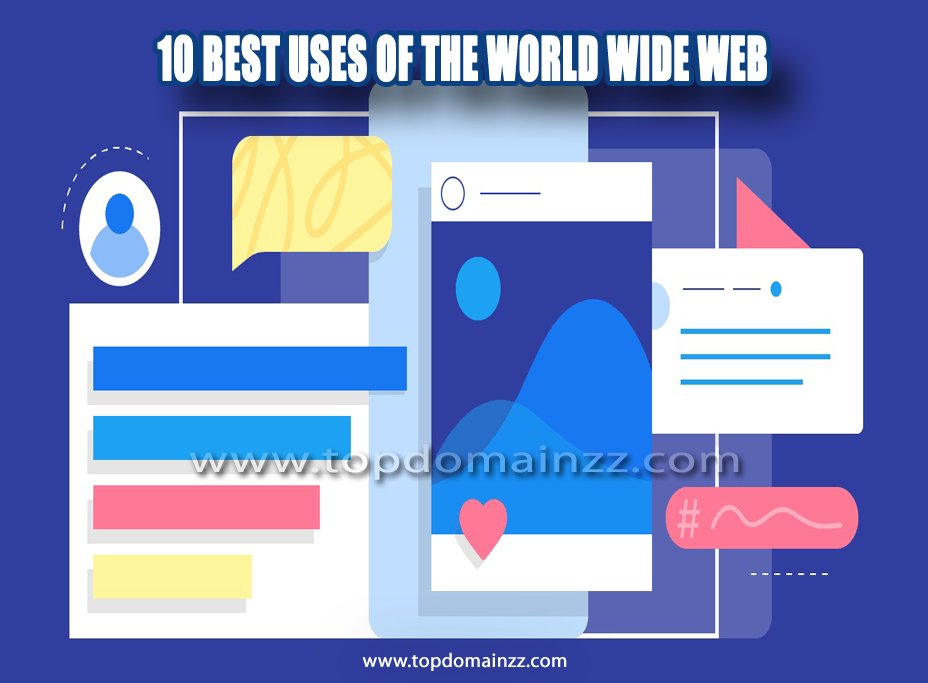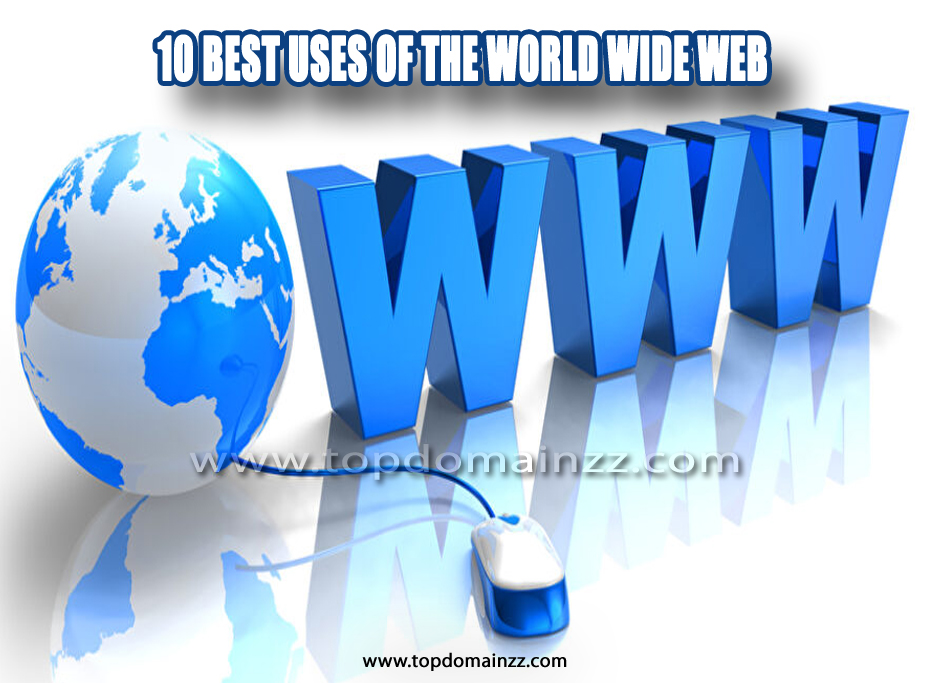10 Best Uses of the World Wide Web
Introduction:
The World Wide Web, a wonder of human creativity, has woven itself flawlessly into the texture of present-day culture and re-imagined how we impart, learn, shop, and connect with our general surroundings. Since its initiation, the web has crossed borders, associating people from all sides of the world and altering pretty much every part of our lives. In this complete study, we dive further into the 10 Best Uses of the World Wide Web, uncovering the complexities of its applications and the significant effect it has on people and networks all over the planet.
1. Admittance to data and information– World Wide Web
The job of the Web as a vault of limitless information couldn’t possibly be more significant. The coming of web search tools like Google, Bing, and Hurray democratized admittance to data and made an abundance of information accessible to us with only a couple of keystrokes. From scholarly exploration papers to Do-It-Yourself instructional exercises, clients can investigate an interminable cluster of points, fulfill their interests, and grow their viewpoints.
Sites like Wikipedia have arisen as computerized libraries that offer thorough articles on many points, organized and cooperatively altered by volunteers from around the world. This democratization of data has empowered people to become long-lasting students and cultivated a culture of scholarly interest and decisive reasoning.
Notwithstanding web search tools and all-encompassing sites, there are numerous instructive assets accessible on the Web, including web courses, talks, and instructional exercises. Stages like Coursera, Udemy, and Khan Foundation have democratized training, offering courses in essentially every possible subject educated by specialists from esteemed organizations.
Understudies can acquire new abilities or extend how they might interpret complex ideas from the solace of their own homes at their own speed. Also, scholastic diaries, research vaults, and computerized libraries give significant assets to researchers and analysts, working with the scattering of information and the headway of human comprehension.
2. Correspondence and informal communities– World Wide Web
The Web has reformed correspondence, beating geographic hindrances and advancing associations across mainlands. Long-range interpersonal communication stages like Facebook, Twitter, and Instagram have become virtual squares where companions, family, and colleagues accumulate to share constant updates, photographs, and considerations. These stages have re-imagined the idea of social collaboration, permitting people to keep up with connections, make new associations, and be educated about the lives of others paying little mind to actual distance.
Notwithstanding private contacts, the Web has worked with proficient systems administration and joint effort through stages like LinkedIn. Experts can grandstand their abilities and accomplishments, associate with friends and guides, and investigate vocation valuable open doors in their fields. Additionally, informing applications, for example, WhatsApp and Wire have worked on correspondence in both individual and expert settings, empowering texting, voice calls, and video visits with people or gatherings.
Furthermore, the Web has led to online networks and gatherings where people with normal interests or personalities can meet to talk about points, look for counsel, and proposition support. These virtual networks act as focuses of information trade and common strengthening, improving the existences of their individuals and cultivating a feeling of having a place in an undeniably associated world.

3. Internet business and web-based shopping– World Wide Web
The appearance of web-based businesses has changed the retail scene, offering customers unmatched shopping accommodations and decisions. Online commercial centers like Amazon, eBay, and Alibaba have democratized admittance to labor and products, permitting customers to peruse a wide determination of items from the solace of their homes, whenever of the day or night. From gadgets and dresses to food and family basics, anything can be bought online with only a couple of snaps, wiping out the requirement for actual retail facades and stretching out organizations’ scope to a worldwide crowd.
The comfort of Internet shopping reaches out from item choice to installment and conveyance. Secure installment doors and encryption advances guarantee that exchanges are secure and impart trust in web-based customers. Furthermore, developments in coordinated operations and transportation have made home conveyance quicker and more dependable than at any time in recent memory, with express transportation and impromptu conveyance choices accessible in numerous districts.
Notwithstanding customary retail, the Web has led to a flourishing biological system of computerized items and administrations, including digital books, computerized music, and web-based video. Stages like Netflix, Spotify, and Fuel offer admittance to a tremendous library of content on a membership premise, giving customers limitless on-request diversion choices. The Web has additionally upset how we consume news and media, with online distributions, sites, and virtual entertainment stages filling in as the essential wellsprings of data and amusement for billions of clients all over the planet.
4. Training and e-learning– World Wide Web
The Web has democratized training, separated obstructions to learning, and opened new roads for the individual and expert turn of events. E-learning stages like Coursera, Udemy, and edX offer a different scope of seminars on points going from software engineering and business to artistic expression and humanities, educated by teachers from famous organizations all over the planet. Understudies can browse various configurations, including video addresses, intuitive tests, and companion looked-into tasks, to fit their opportunity for growth to suit their singular inclinations and objectives.
One of the critical benefits of e-learning is its adaptability and availability. Understudies can get to concentrate on materials and talks whenever, anyplace with a web association, permitting them to offset their examinations with work, family, and different responsibilities. Also, e-learning stages frequently offer monetary guidance and grants to make instruction more reasonable and open to understudies from assorted foundations.
Notwithstanding formal schooling, the Web offers an abundance of instructive assets and devices, including educational recordings, instructional exercises, and intuitive recreations. Stages like YouTube, Khan Foundation, and TED Talks give important learning materials on a wide assortment of points that take special care of understudies of any age and expertise level. Moreover, online networks and discussions offer open doors for peer learning and coordinated effort, permitting understudies to share information, trade thoughts, and back each other on their instructive excursions.
5. Amusement and computerized media– World Wide Web
The Web has upset media outlets, offering buyers uncommon admittance to an abundance of computerized content and encounters. Real-time features like Netflix, Hulu, and Disney+ have altered how we consume motion pictures and Network programs, permitting viewers to view their #1 substance on request, without the limitations of conventional transmission plans. Additionally, stages like Spotify, Apple Music, and YouTube Music have reformed the music business, offering clients admittance to a great many melodies and collections from their number one craftsmen, as well as organized playlists and customized proposals.
Notwithstanding video and music web-based, the Web has led to new types of amusement and advanced media. Electronic gaming has transformed into a popular interruption, with countless players all around the planet battling in multiplayer games and virtual universes. Stages like Jerk and Blender have changed gaming into a casual exercise, with live streams and esports contests attracting a large number of viewers and creating remunerating revenue streams for top gamers and content creators.
Furthermore, client-produced content stages like YouTube, TikTok, and Instagram have permitted people to make and impart their substance to the world. From video blogs and how-tos to images and viral difficulties, client-created content has turned into a social peculiarity that shapes patterns and significantly impacts mainstream society. The Web has democratized imagination and led to another age of computerized specialists, forces to be reckoned with, and content makers who have colossal impact and arrive at via virtual entertainment stages.

6. Examination and cooperation– World Wide Web
The Web has upset how the examination is led and scattered, working with a coordinated effort between researchers, researchers, and specialists all over the planet. Online data sets, diaries, and vaults give admittance to a large number of logical articles, research papers, and scholastic assets, empowering specialists
stay aware of the most recent improvements in their fields and expand on those crafted by their partners. Stages, for example, Google Researcher and PubMed offer strong inquiry devices and reference measurements to assist specialists with finding applicable writing and track the effect of their work.
Notwithstanding admittance to explore materials, the Web has empowered continuous coordinated effort and correspondence among specialists. Cooperation instruments like Google Docs, Microsoft Groups, and Slack permit scientists to team up on reports, introductions, and information examination no matter what their geographic area. Moreover, stages like GitHub work with cooperative programming advancement, permitting software engineers to effortlessly share code stores, track changes, and add to open-source projects.
The Web has additionally democratized the insightful distributing process with the ascent of open-access diaries and preprint archives. Stages, for example, arXiv and bioRxiv permit analysts to impart their discoveries to mainstream researchers before they go through peer surveys, speeding up the spread of information and advancing straightforwardness in the examination cycle. What’s more, online meetings and online courses give amazing open doors for analysts to introduce their work and participate in conversations and organization with partners all over the planet without voyaging or driving.
7. Admittance to state organization administrations– World Wide Web
States all over the planet have embraced the Web for of further developing admittance to public administrations and data, smoothing out regulatory cycles, and upgrading resident commitment. Official government sites act as incorporated entries to get to a large number of administrations, including applying for travel papers, restoring driver’s licenses, and paying charges on the web. E-government drives have robotized numerous standard assignments, lessening desk work and sitting tight times for residents while working on the proficiency and straightforwardness of government activities.
Likewise, government sites frequently give admittance to important assets and data, including general well-being warnings, security alarms, and crisis notices. During catastrophic events or general well-being emergencies, the Web fills in as a basic correspondence channel that permits states to rapidly and productively scatter data to impacted populations. Moreover, stages, for example, OpenGov and Data.gov give admittance to government information and measurements, permitting residents to consider their chosen authorities responsible and take part in the vote-based process.
Notwithstanding admittance to taxpayer-supported organizations and data, the Web has worked with city commitment and political activism. Web-based entertainment stages, for example, Twitter and Facebook have become amazing assets for preparing support, bringing issues to light, and sorting out grassroots missions on a large number of social, ecological, and policy-driven issues. Online request stages like Change.org and Avaaz permit people to voice their interests and promote change while giving open doors to local area arranging and aggregate activity.
8. Medical services and telemedicine– World Wide Web
The Web has changed the medical services industry, offering patients exceptional admittance to clinical data, assets, and administrations. Wellbeing data sites and online gatherings give important assets to patients looking for data about medical issues, therapy, and preventive considerations. From respectable sources like the Mayo Facility and WebMD to patient care groups and online networks, the Web offers an abundance of assets to assist people with settling on informed conclusions about their well-being and prosperity.
Notwithstanding admittance to well-being data, the Web has worked with telemedicine and far-off medical services administrations, permitting patients to talk with medical care suppliers from the solace of their own homes. Telemedicine stages, for example, Teladoc and Amwell offer virtual counsel with specialists, attendants, and subject matter experts, permitting patients to get clinical guidance, conclusion, and treatment without the requirement for an in-person visit. Telemedicine has demonstrated especially importance in the countries or underserved regions where admittance to well-being administrations might be restricted or inaccessible.
Also, portable well-being applications and wearables have empowered people to assume command over their well-being and proactively screen their well-being status. From wellness trackers and calorie counters to reflection applications and side effect checkers, these advanced devices furnish clients with important data about their well-being and ways of behaving and permit them to follow progress toward their health objectives.
Furthermore, distant patient observing advances permit medical services suppliers to screen patients’ important bodily functions and well-being measurements from a distance, empowering early intercession and customized care for patients with persistent circumstances.

9. Informing and information sharing– World Wide Web
The Web fills in as an immense store of data and information that interfaces billions of people all over the planet through nearby, public, and worldwide stages. News sites, online magazines, and web-based entertainment sites like Twitter, Facebook, and Reddit go about as center points where clients can find, share, and examine articles, recordings, and conclusions with their companions.
In any case, the multiplication of misrepresentation and falsehood online has raised worries about the dependability and believability of Web sources. The intricacy of spotting “counterfeit news” has been compounded by calculations and altered content on different sites, possibly prompting falsehood and inclination. The outcome has been a purposeful exertion by people and associations to battle falsehood and advance media proficiency, empowering clients to perceive the validity of online sources and recognize reality from fiction.
Furthermore, the Web has democratized admittance to different sentiments, permitting loose writers and elective news sources to scatter data and cultivate basic talk. Sites, webcasts, and specialty sites offer remarkable viewpoints and to-bottom examinations not tracked down in the traditional press, enhancing the variety of voices and empowering transparency. What’s more, analytical news coverage projects saddle the Web’s ability to reveal stories, scatter data, and consider strong substances responsible.
10. Backing and activism– World Wide Web
The Web has demonstrated to be an amazing asset for support and activism, working with worldwide coordinated efforts to address social, natural, and policy-centered issues. Online request stages like Change.org and Avaaz permit clients to send off nearby missions on a great many issues and gain support from a worldwide crowd. Online entertainment stages like Twitter, Facebook, and Instagram intensify support endeavors and permit clients to share stories, pictures, and recordings, advancing public commitment and talk.
What’s more, internet gathering pledges stages, for example, GoFundMe and Kickstarter give valuable open doors to people and associations to raise assets for purposes that advance positive change and affect networks. Crowdfunding efforts have turned into a vehicle for financing social effect projects, beneficent drives, and debacle aid ventures, permitting allies to have a substantial effect on the existences of others. Likewise, online dissent developments, hashtags, and viral missions have activated networks and brought issues to light issues as racial uniformity, natural insurance, and LGBTQ+ privileges.
Concluding Lines:
The Web is continually developing and extending, offering boundless open doors for correspondence, coordinated effort, and progress. From getting to data to driving social change, the Web has turned into a fundamental apparatus in our interconnected world. As innovative advances impel us forward and web access becomes universal, the capability of the web to mold our lives and society is essentially boundless.
It is crucial to outfit the force of the Web capably and guarantee that it stays a power for good and serves the interests and needs of people and networks all over the planet. As we explore the computerized scene of the 21st hundred years, we should tackle the colossal capability of the Web to make a more comprehensive, just, and associated world for all.

